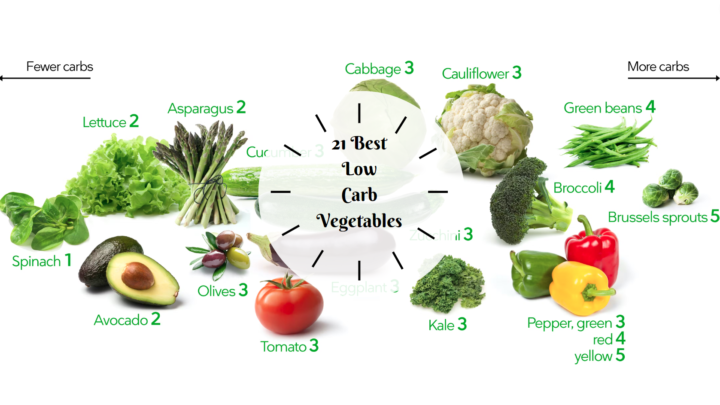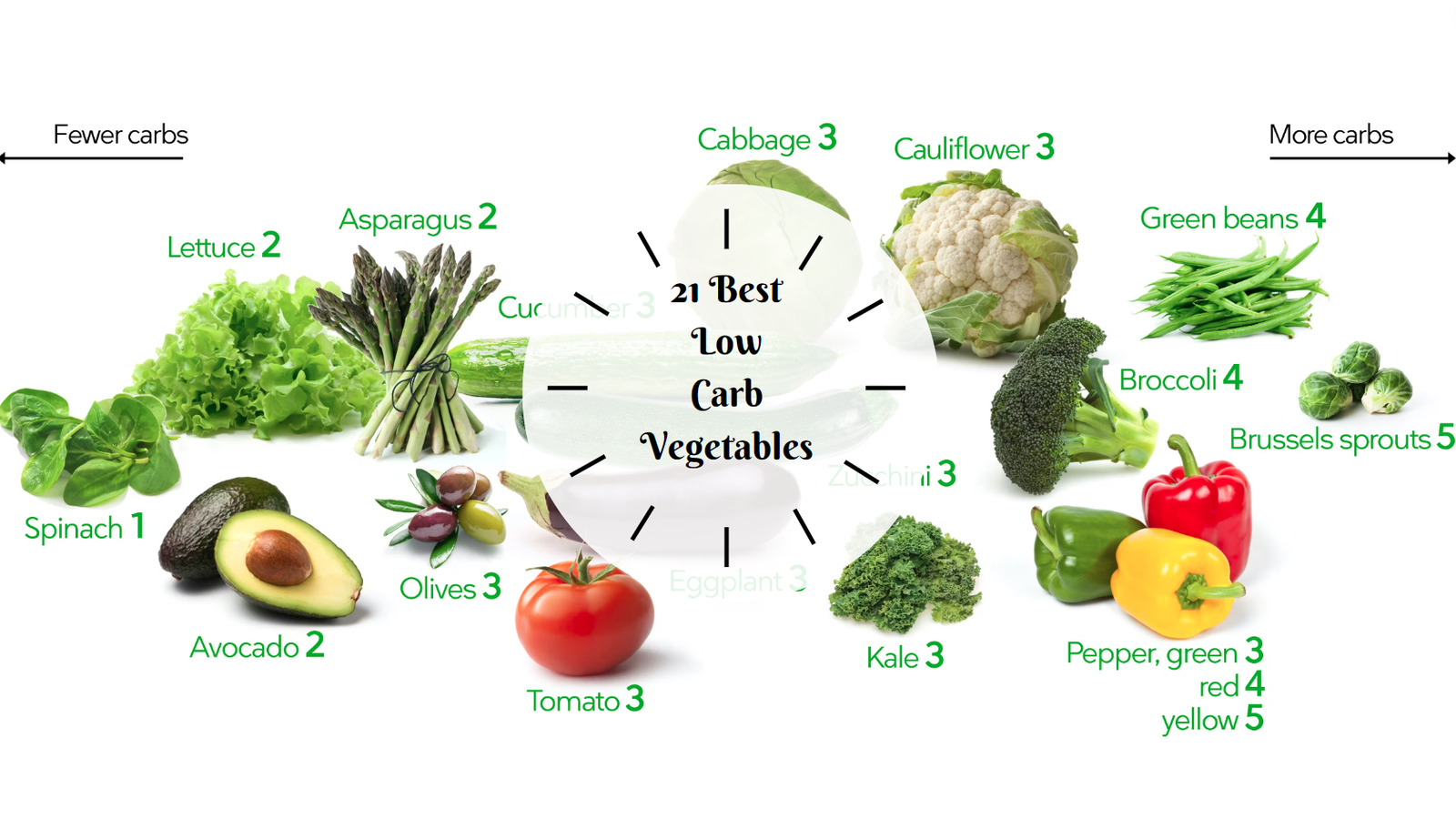Are you aiming for a healthier lifestyle with a low-carb diet? One vital step is adding low carb vegetables to your meals. These veggies, full of nutrients, not only help with weight management but also supply your body with crucial vitamins and minerals.
In this guide, we’ll explore the realm of low-carb vegetables.
Benefits of Low Carb Vegetables
- Low carb vegetables bring a host of health benefits. They are rich in fiber, aiding digestion and keeping you feeling full, which is great for weight management.
- Additionally, these veggies are loaded with essential vitamins and minerals, promoting overall well-being. Including them in your diet can help stabilize blood sugar levels, making them an excellent choice for those with diabetes or those looking to manage their carb intake.

List of 21 Low Carb Vegetables
- Let’s now jump into the exciting world of low-carb vegetables that can elevate your meals without compromising your health goals.
- Spinach:
- Low in carbs and rich in iron, spinach is a versatile leafy green that can be used in salads, smoothies, or sautéed dishes.
- Kale:
- Packed with nutrients, kale is a nutritional powerhouse that adds a robust flavor to salads or can be baked into crispy kale chips.
- Swiss Chard:
- With its colorful stems and dark green leaves, Swiss chard is not only visually appealing but also low in carbs and high in vitamins.
- Broccoli:
- A cruciferous vegetable, broccoli is a low-carb choice that’s high in fiber, vitamin C, and various antioxidants.
- Cauliflower:
- Known for its versatility, cauliflower can be transformed into rice, mashed “potatoes,” or even a pizza crust, making it a staple in low-carb diets.
- Brussels Sprouts:
- These miniature cabbages are not only low in carbs but also rich in fiber, vitamin K, and antioxidants.
- Bell Peppers:
- Colorful and sweet, bell peppers are a low-carb vegetable high in vitamin C, making them a tasty addition to salads and stir-fries.
- Zucchini:
- With a mild flavor, zucchini can be spiralized into noodles or sliced for roasting, offering a low-carb alternative to pasta.
- Tomatoes (in moderation):
- While slightly higher in carbs, tomatoes provide essential nutrients and can be enjoyed in moderation.
-
Carrots in moderation
- Carrots, when eaten in moderation, offer a hint of sweetness and are a source of beta-carotene.
- Radishes:
- Crisp and peppery, radishes are low in carbs and add a delightful crunch to salads.
- Turnips:
- A root vegetable with a mild flavor, turnips are a low-carb alternative to potatoes and can be roasted or mashed.
- Cucumber:
- Refreshing and low in carbs, cucumbers make a great addition to salads or can be enjoyed as a crunchy snack.
- Asparagus:
- Rich in vitamins A and C, asparagus is a low-carb vegetable that can be grilled, roasted, or sautéed.
- Mushrooms:
- Versatile and low in carbs, mushrooms can be used in various dishes, adding a savory umami flavor.
- Cabbage:
- Whether used in coleslaw or sautéed, cabbage is a low-carb cruciferous vegetable with numerous health benefits.
- Eggplant:
- With its spongy texture, eggplant is a low-carb vegetable that can be grilled, roasted, or used in casseroles.
- Celery:
- Low in calories and carbs, celery adds a satisfying crunch to dishes and is a popular choice for snacking.
- Green Beans:
- These crisp, green vegetables are low in carbs and high in fiber, making them a nutritious side dish.
- Cauliflower Rice:
- A low-carb alternative to traditional rice, cauliflower rice can be used in various dishes for a lighter option.
- Lettuce (Various Types):
- Whether it’s romaine, iceberg, or arugula, different types of lettuce are low in carbs and make excellent bases for salads or wraps.
- Spinach:
Incorporating Low Carb Vegetables
- Adding these vegetables to your daily meals is simple and tasty. Create lively salads with a mix of leafy greens, tomatoes, and bell peppers. Roast broccoli and cauliflower for a delicious side dish, or stir-fry zucchini and mushrooms for a quick and low-carb vegetable medley. The options are limitless, allowing you to enjoy a variety of flavors while keeping your carb intake in check.
Also Read : 10 Lemon Ginger Tea benefits You Didn’t Know About
Top 5 Frequently Asked Questions

- Are all vegetables low in carbs?
- While most vegetables are naturally low in carbs, some may have higher levels. It’s crucial to be mindful of portion sizes, especially with starchy vegetables like potatoes.
- Can I eat unlimited amounts of low-carb vegetables?
- While low-carb vegetables are generally low in calories, maintaining a balanced diet is still essential. Eating a variety of vegetables in moderation ensures you get a mix of nutrients.
- Are canned or frozen vegetables a good option for a low-carb diet?
- Yes, they can be. However, be cautious of added sauces or sugars in canned vegetables. Opt for frozen varieties without added sauces for a convenient and low-carb option.
- How can I add flavor to low-carb vegetables without adding carbs?
- Enhance the taste of your veggies with herbs, spices, and healthy fats like olive oil or butter. These additions can elevate the flavor without significantly increasing carb content.
- Can I eat root vegetables on a low-carb diet?
- In moderation, yes. Root vegetables like carrots and turnips can be included, but it’s crucial to be mindful of portion sizes to keep carb intake in check.
Being mindful of the carb content in your vegetables is a smart approach to managing your overall carbohydrate intake. Experiment with different low-carb vegetables to find your favorites and create a diverse and satisfying menu.
Low carb journey doesn’t mean sacrificing flavor or variety. With the myriad of low carb vegetables available, you can create delicious, nutritious meals that support your health goals. Whether you’re crafting a colorful salad or savoring roasted cruciferous veggies, the options are endless. Make the most of this guide to navigate the world of low-carb vegetables and enjoy a healthier, more vibrant lifestyle.
External Resources
These resources offer valuable insights, expert advice, and practical recipes to support your journey toward a healthier lifestyle with low-carb vegetables.








